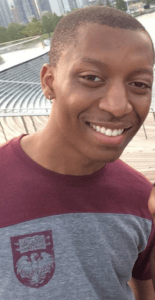 |
Marcus Lee, PhD Student | Political Science
2016-2017 Ford Foundation Pre-Doctoral Fellow
What drew you to the Ford Foundation’s fellowship program? What about it seemed like a good fit for you and your work at the time that you were applying?
What drew me to the Ford Foundation’s fellowship program was the opportunity to network with scholars of color in my field and others. I entered The University of Chicago with myriad interests, and I knew that I would need to nestle myself within—or maybe even create—an intellectual community that would help me hone in on a few ideas. However, the underrepresentation of people of color in academia not only means fewer Black and Brown people in my field, but also fewer scholars of race, gender and sexuality in general. Hence, I knew that the intellectual community I needed was not a given. The Ford Foundation has enabled me to connect with scholars of color across fields, in order to exchange ideas, advice, and/or words of encouragement. Further, since it is composed of scholars from various fields, the Ford fellow community encourages the sort of innovative, interdisciplinary research that I aspire to engage. In short, the Ford network is what initially enticed me to apply. (Oh, and the money—I can’t forget about the money!)
Is there a particular experience that the Ford Fellowship has enabled that’s been memorable or stands out to you (or perhaps has even surprised you)?
At the most recent Conference of Ford Fellows, I had the chance to workshop a few ideas for a developing project. I presented my ideas in the form of a short experimental paper, entitled “The Making of History in the Final Instance: Black Gay Politics in Feminist Time,” in which I sought to track how feminist theorists historicize Black gay politics. This line of inquiry grew out of a term paper that I had written for Linda Zerilli’s “New Directions in Feminist Political Theory” course. Professor Zerilli, noting promise in my budding ideas, encouraged me to flesh them out a bit more. So, when Ford sent out its Call for Papers shortly after our class ended, I saw it as an opportunity to do just that. Upon presenting my paper, I received great feedback on how to make my argument more compelling, how to connect it to broader debates in the literature, and how to specify my claims. I even connected with a few scholars who are pursuing similar lines of inquiry. And, now, what was once an experimental paper feels more like the seed of a dissertation project. This experience probably stands out to me most.
In addition to the Ford, you’ve also held fellowships from the Point Foundation and the APSA. When applying for multiple fellowships, how have you gone about presenting yourself and your research for each specific opportunity?
For each application process, I try my best to present my ideas with passion and clarity—which, for me, includes demonstrating to reviewers the stakes of my proposals and clearly stipulating how I would go about completing the projects. When writing about my work, I am always intent on conveying why my questions are necessary and on delineating how I plan to pursue them. I should note, though, that I have never applied for a fellowship with a concrete vision of what I will study; my ideas were, and are, seeds of a project, at best. However, by making plain the stakes of my ideas, I think I illustrated for my reviewers the potential in my ideas, despite their embryonic form.
More about Marcus
Marcus Lee is a second-year doctoral student in Political Science at The University of Chicago, where he is a Ford Predoctoral Fellow, an American Political Science Association Minority Fellow and a Point Scholar. His research interests include race, gender and sexuality; American Political Development and political historiography; extra-systemic politics; and the bureaucracy. He is especially interested in black politics post-1968 – i.e. the emergence and development of different streams of black politics after King’s death; the production of historical narratives of the 70s, 80s and 90s; and the normative implications and political consequences of those narratives for our current moment. He is currently working on a separate project that traces the formative logic of Florida’s Stand Your Ground law.
More about the Ford
Through its Fellowship Programs, the Ford Foundation seeks to increase the diversity of the nation’s college and university faculties by increasing their ethnic and racial diversity, to maximize the educational benefits of diversity, and to increase the number of professors who can and will use diversity as a resource for enriching the education of all students. Ford offers funding opportunities at the predoctoral, dissertation, and postdoctoral levels. More information here.